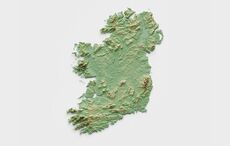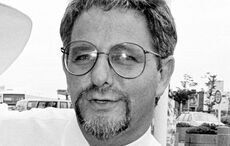AT about 12:30 p.m. on Monday afternoon, December 3, at the University Club in midtown Manhattan, history walked in the door of the Consul Room on the seventh floor.
There for all to see were Martin McGuinness, former IRA member and now Northern Ireland's deputy first minister, and the Reverend Ian Paisley, former demagogue and now first minister in the new Northern Ireland government, striding into the room together.
We had heard about it, read about it and talked about it, but seeing the two old enemies together in the cold light of day was something else altogether. It was one of the most extraordinary sights I have witnessed in my career.
It was up there with Gerry Adams stepping off a plane at JFK Airport in February 1994, President Bill Clinton striding onto the stage at Belfast City Hall in November 1995, and the same Reverend Paisley shaking hands and greeting the Irish Taoiseach (Prime Minister) Bertie Ahern at the site of the Battle of the Boyne in Co. Math last summer.
The two men stood framed in the doorway for a few moments, until they were announced. Paisley is older now, the once great physical presence now reduced. McGuinness still has that choirboy look, but the years both men have spent in the crucible of the Troubles have no doubt weighed heavily on them.
Both were under constant death threat during their political careers. Both suffered horrific deaths of friends and colleagues close to them. Yet somehow they reached beyond the far side of revenge and found a way to work together.
The spontaneous applause that greeted them at the lunch on Monday was heartfelt from a group of Americans, many connected with the National Committee on American Foreign Policy, which has highlighted this issue since 1993.
It surely must give hope to every conflict ridden area on earth that arch enemies such as Paisley and McGuinness could so convincingly bury the hatchet and begin a partnership that existed only in some fantasyland version of Northern Ireland just a few short years ago.
There to greet them was the ramrod straight figure of Bill Flynn, chairman of the National Committee on American Foreign Policy, who was hosting the historic event.
Flynn was not just a disinterested host. Before it was popular or fashionable he had involved himself in Northern Ireland at a time when the Troubles were at their height.
He was a co-founder of the Irish American peace delegation back in 1993, and in the ensuing decade and half has immersed himself in the issue of bringing peace to Northern Ireland. It was entirely fitting that he was the man to greet the two ministers on their historic trip together to New York.
Flynn was the driving force behind the National Committee on American Foreign Policy and their detailed involvement in the Northern Ireland issue. Over the years they had often been a lonely voice providing a platform for speakers from all sides on Northern Ireland.
Now at last they were hosting the one event that made all those previous meetings worthwhile. Flynn could stand even taller.
Just to show how far the situation has moved on, the Reverend Paisley, accompanied by his son Ian Junior and wife Eileen, and McGuinness made remarks, which quite deliberately omitted any talk of politics.
The theme was Northern Ireland is open for business, the equivalent really of a long run down neighborhood suddenly getting its first coat of paint, and seeds of hope springing from previously fallow soil.
Both men admitted there was a long way to go, but speakers around the table such as New York City Comptroller William Thompson and several venture capitalists pointed the way for Northern Ireland to become a major player when it comes to American investment in the European Union.
Economic issues are now at the heart of the Northern Ireland problem, and there is no disguising that after the decades of the Troubles, there is much work to be done.
But for a brief shining moment on Monday, the good news overwhelmed the bad in our world, and Martin McGuinness and Ian Paisley proved that sometimes things don't go from bad to worse, but from bad to much, much better.




Comments